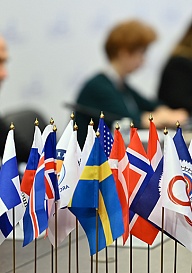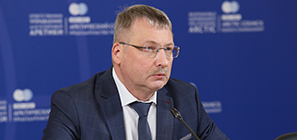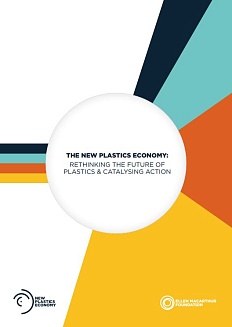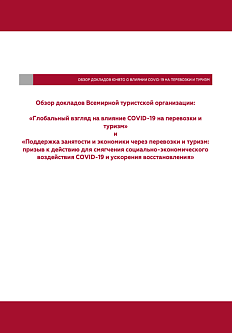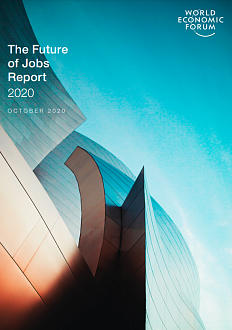The first meeting of the Arctic Council’s Sustainable Development Working Group (SDWG), chaired by Russia, took place from 26–28 October in a hybrid format in Moscow. The event was hosted by the Roscongress Foundation.
The Arctic Council’s Sustainable Development Working Group seeks opportunities to protect and improve the environment, economy, culture and health of indigenous peoples and Arctic communities. «Sustainable development of the Arctic region requires a balanced approach and includes three integrative elements: environmental, social and economic development. The Arctic Council, and especially our Working Group, is where all these elements come together, which is why the Russian Federation attaches so much importance to our work», said Nikolai Korchunov, Ambassador-at-Large for the Russian Ministry of Foreign Affairs, on the first day of the meeting.
More than 130 people participated in the three-day SDWG meeting. As is traditional, the meeting was attended by representatives of the Arctic Council member states (Russia, Canada, Denmark, Finland, Iceland, Norway, Sweden and the USA) and its permanent participants, which are delegates from the Arctic Athabaskan Council, Aleutian International Association, Gwich’in Council International, Inuit Circumpolar Council, Saami Union and the Russian Association of Indigenous Peoples of the North, Siberia and the Far East (RAIPON). In addition, the Arctic Council observer states were represented at the meeting, as well as three inter-parliamentary and seven non-governmental organizations with observer status and the European Union.
During the three-day meeting, participants discussed current and potential SDWG projects, as well as the organization of the future activities of the Arctic Council Sustainable Development Working Group itself. «The capacity of the SDWG is increasing, the amount of work is increasing. And we have an obligation to respond adequately to this change and this responsibility», said Grigory Dukarev, RAIPON co-chair.
Main topics
1. Organizational changes in the work of the SDWG
The Arctic Council was established in 1996 as an intergovernmental forum to promote international cooperation in the high latitudes, and Russia is chairing the organization for the second time in its history and will remain in that capacity from 2021 to 2023. The cross-cutting priority of the Russian Chairmanship of the Arctic Council will be ’Responsible Governance for a Sustainable Arctic’.
2. SDWG projects from coronavirus to food culture
The work of the Arctic Council’s Sustainable Development Working Group is supported by two subsidiary expert groups. The first (AHHEG) brings together experts on human health in the Arctic and is responsible for medical and health issues in the circumpolar region. The second (SECEG) deals with social, economic and cultural issues.
A key focus for the AHHEG experts was to study the spread of the COVID-19 coronavirus in the Arctic and to develop measures to counteract the pandemic.
Among the priority topics for SECEG discussion are increasing the resilience of indigenous communities, cities and businesses in the Arctic, renewable energy development, the preservation and transfer of knowledge of the peoples of the North, and gender equality.
In June this year, the Arctic Council’s Sustainable Development Working Group endorsed the project «Health Implications of COVID-19 for Arctic Communities». Understanding the urgency of the pandemic, the SDWG decided to go beyond that and endorsed another project in this area, prepared by Russia, Canada, the World Wildlife Fund, the Gwich’in Council International and the Aleutian International Association, the «Inclusion of COVID-19 in the Arctic assessment report». One of the project’s outcomes will be recommendations to the Arctic Council leadership, which will reflect on how the pandemic has evolved in the Arctic and present security issues in the macro-region. Also during this project, experts will identify the main parameters of the spread of coronavirus in the Arctic, assess the effectiveness of measures applied both by the authorities and local communities, and consider age, psychological and gender aspects.
Another important area of SDWG work relates to renewable energy projects and the transition to carbon neutrality. The relevance of these issues is related to climate change, which is most visible in the Arctic, where the rate of warming is twice as high as the global rate of warming. One of the most ambitious projects in this area involves the creation of the Snezhinka international Arctic station, a year-round, fully autonomous complex that will run on renewable energy sources and hydrogen power. Two sites for the station will be located in Yamal and Murmansk Oblast. They will be used to test environmentally friendly life support technologies, as well as robotics systems, telecommunications, medicine, biotechnology and new materials. The project has been approved by all member states of the Arctic Council and is supported by the Russian Government. Construction of the plants is scheduled to begin next autumn, with the goal of putting them into test operation in 2024.
Many of the projects of the Arctic Council’s Sustainable Development Working Group aim to preserve and develop the cultures, traditions, languages and even the cuisines of the indigenous peoples of the North.
The main SDWG youth project is the Arctic Children: Pre-School and School Education, which Russia has been implementing with Canada and Finland since 2017 to make education accessible and preserve indigenous cultures and languages.
Issues of social well-being of Arctic residents were also of concern to SDWG participants. One of the highlights was the Arctic Demographic Index project, whose preliminary results were presented by the Russian delegation. It gathered statistical data for the past ten years from 19 Arctic regions in five countries: Russia, Canada, Norway, Finland and Sweden. The number in question is 4.5 million people, 2.5 million of whom live in Russia. The resulting tool makes it possible to compare not only countries and regions, but also individual cities and municipalities according to pre-set criteria. Thanks to this tool, it is possible to track population trends in the Arctic, including indigenous peoples, and changes in population density. This, among other things, makes it possible to see the outflow or inflow of population. And it does so for specific age groups. At a new stage, the authors of the project plan to analyze the information collected and make forecasts about changes in the demographic situation in the Arctic.
Other social projects include improving food security, indigenous suicide prevention and gender equality in the Arctic.
3. The future of the SDWG — new projects and ideas
Over the three days of work, the Arctic Council’s Sustainable Development Working Group considered more than 20 projects, many of them initiated by the Russian delegation. Three new projects were approved. In addition to the COVID-19 inclusion in the Arctic assessment report, they were «Preserving Arctic architectural heritage» and «Enhancing resilience in the Arctic: Exploring resilience aspects in the Arctic related to the impact of permafrost thawing». They are all proposed by representatives of Russia
For more analytical materials on the Arctic agenda, see the Roscongress Information and Analytical System roscongress.org/en/knowledge/arktika/materials/.


